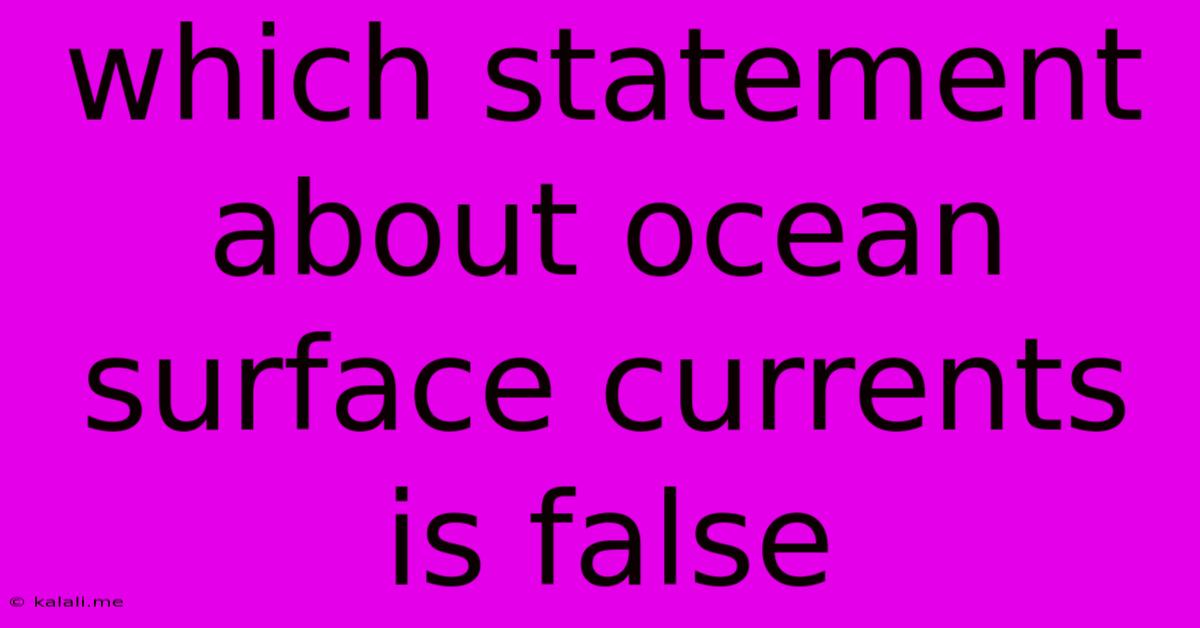Which Statement About Ocean Surface Currents Is False
Kalali
Jun 15, 2025 · 3 min read

Table of Contents
Which Statement About Ocean Surface Currents is False? Debunking Common Misconceptions
Ocean surface currents, those vast rivers of water flowing across the globe, play a crucial role in regulating Earth's climate, distributing marine life, and shaping coastal environments. Understanding these powerful forces is key to comprehending our planet's complex systems. But with so much to learn, misconceptions are bound to arise. This article will explore common statements about ocean surface currents and identify the false one, clarifying the science behind these dynamic systems.
Understanding Ocean Surface Currents: A Quick Overview
Before diving into the false statement, let's establish a basic understanding. Ocean surface currents are primarily driven by wind patterns, the Earth's rotation (Coriolis effect), and the shape of the continents. These currents are not static; they are constantly changing in response to various factors, including seasonal variations, temperature differences, and salinity. They transport enormous amounts of heat, influencing global weather patterns and creating distinct climatic zones. They also facilitate the distribution of nutrients and marine organisms, supporting biodiversity across the oceans.
Common Statements and the False Claim
Let's examine some common statements about ocean surface currents and identify the one that's incorrect:
-
Statement 1: Ocean currents are influenced by the Earth's rotation. This is true. The Coriolis effect, caused by the Earth's rotation, deflects moving water to the right in the Northern Hemisphere and to the left in the Southern Hemisphere. This deflection significantly impacts the direction and flow of ocean currents.
-
Statement 2: Surface currents primarily flow in a circular pattern called gyres. This is true. Major ocean basins contain large, rotating systems of currents called gyres. These gyres are driven by prevailing winds and influenced by the Coriolis effect. Examples include the North Atlantic Gyre and the South Pacific Gyre.
-
Statement 3: Ocean surface currents have little impact on global climate. This is false. This is the incorrect statement. Ocean currents are major players in global climate regulation. They transport vast amounts of heat from the equator towards the poles, moderating temperatures in coastal regions and influencing weather patterns worldwide. The Gulf Stream, for instance, significantly warms Western Europe.
-
Statement 4: The temperature and salinity of water influence ocean currents. This is true. Differences in water density, driven by temperature and salinity variations (thermohaline circulation), create vertical and horizontal movements in the ocean, influencing surface currents. Colder, saltier water is denser and tends to sink, while warmer, less saline water rises.
-
Statement 5: Upwelling zones bring nutrient-rich water to the surface. This is true. Upwelling, a process where deep, cold, nutrient-rich water rises to the surface, is crucial for marine ecosystems. It supports high levels of primary productivity and biodiversity in areas where it occurs.
Conclusion: The Importance of Accurate Information
Understanding ocean surface currents is vital for comprehending the Earth's climate system and its intricate workings. Misconceptions can lead to inaccurate predictions and flawed management strategies related to climate change, marine conservation, and resource utilization. By dispelling common misconceptions and emphasizing the critical role of these currents, we can improve our understanding of our planet and make informed decisions about its future. The statement that ocean surface currents have little impact on global climate is demonstrably false, highlighting the profound influence these dynamic systems have on our world.
Latest Posts
Latest Posts
-
What Is Mmxvi In Roman Numerals
Jun 16, 2025
-
2nd Highest Civilian Award In India
Jun 16, 2025
-
In What Layer Of The Atmosphere Do Planes Fly
Jun 16, 2025
-
Which Of The Following Is Not A Presentation Software Term
Jun 16, 2025
-
When Dissolved In Water Acid Produce
Jun 16, 2025
Related Post
Thank you for visiting our website which covers about Which Statement About Ocean Surface Currents Is False . We hope the information provided has been useful to you. Feel free to contact us if you have any questions or need further assistance. See you next time and don't miss to bookmark.